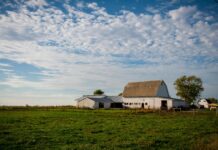UNIVERSITY PARK, Pa. — Pennsylvania forage growers should hope for a long fall season with good weather to help their hay crop and pastures, said a forage specialist in Penn State’s College of Agricultural Sciences.
Marvin Hall, professor of forage management, said that an extended autumn with rain can make up for some of this year’s shortfall in hay.
“If we have a long fall and the pasture is managed right, the animals could graze until mid- to early November,” Hall said. “If we have a frost or snow in mid-October, that’s an extra 30 days the farmer has to feed dry hay that they don’t have. That’ll increase costs.”
With fields in poor condition over the summer, the hay crop has taken a hit.
“We had two good cuttings that produced 50 to 60 percent of the seasonal yield of a regular year,” Hall said. “So we’re at about 60 percent of where we should be.”
Lower yield. Hall said that in a year with sufficient rainfall, farmers would harvest 250 small square bales — 40 pounds each — per acre over the entire season, with 175 bales per acre harvested by this time of the year. However, the drought conditions have meant that currently, only 100 bales per acre have been harvested.
He said that he expects livestock producers will have enough to fill their needs, but the year still won’t be easy.
“Combine the hay shortage with corn prices and it will be rough on the livestock industry,” Hall said, adding that producers also will face decreased prices when selling livestock.
Current hay prices are around $250 per ton. Last year, when Pennsylvania went through a similar shortfall situation, prices reached $400 to $500 per ton.
Hall said he wouldn’t be surprised to see those prices again. In a normal year, hay would be shipped to Pennsylvania from the Midwest. However, he said that region is also in trouble, as the severe drought there will mean that not much hay will be available for importing either.
Drought is not the only problem facing producers. “This year, we were surprised by insects, such as the potato leaf hopper,” he said. “That hurt plants and reduced yields even more.”










When there is a hay shortage you can mix alittle beet pulp pettets in with the grain you feed. My cows,horses and goats love it.It dose put on weight so you need to be careful when feeding the horses.I also feed alfalfa pellets durring the winter instead of the alfalfa hay,the animals don’t wast it like they do the hay.